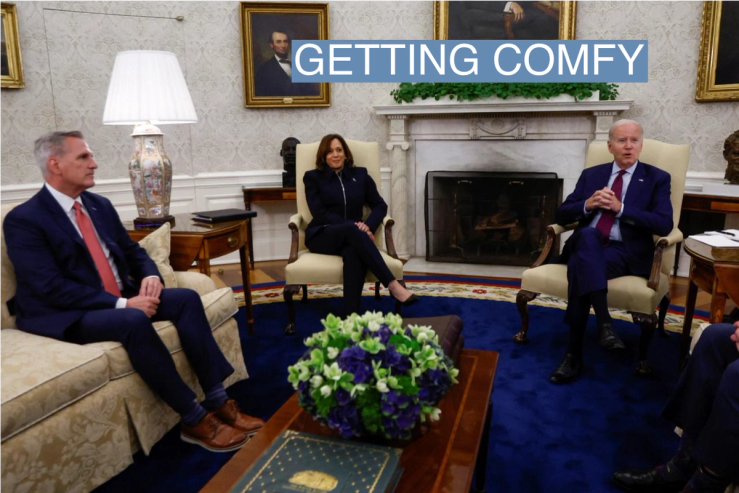The News
President Biden and top congressional leaders sounded somewhat upbeat about their progress on debt ceiling talks after another chat at the White House on Tuesday. But some progressive lawmakers have already begun voicing concern that talks could be heading toward a compromise that would hand Republicans key policy wins.
Biden called the sit down a “good productive meeting” and promised to talk more with House Speaker Kevin McCarthy in the coming days. The Republican leader said the sides were still far apart with time running short before a potential default, but that he was pleased the White House had agreed to negotiate directly with House Republicans going forward, instead of trying to also involve Senate and House Democratic leaders.
“Nothing has been resolved in this negotiation,” McCarthy told reporters. “The only thing that has changed is, we finally have a format that has proven to work years in the past. Now, all the years in the past, they had more time to negotiate.” He added that it might be “possible to get a deal by the end of the week.”
But the day’s movement was accompanied by rising anxiety among some Democratic lawmakers and activists, who believe Biden risks rewarding Republicans for using the threat of a catastrophic default to hack away at the budget — and encouraging similar behavior down the road.
“Folks are worried about the direction that negotiations are headed in and in particular, the fact that the negotiations are starting to look a lot like 2011,” Lindsay Owens, an economist and executive director at the left-leaning Groundwork Collaborative, told Semafor. “Anytime you let Republicans control the terms of the debate around the debt ceiling, you’re in trouble.”
Capitol Hill progressives have been especially concerned about hints Biden may be willing to compromise on Republican demands to add new work requirements to parts of the safety net. On Sunday the president seemed to rule out adding new restrictions to Medicaid, but signaled a willingness to hear out proposals on the Supplemental Nutrition Assistance Program or Temporary Assistance for Needy Families, which provides cash support for some of the poorest households.
“We’re giving credibility to the Republican Party as hostage-takers by even having these meetings and saying publicly that may indicate that we’re willing to negotiate on something like SNAP benefits,” New York Rep. Jamaal Bowman told Semafor, suggesting that part of Biden’s shift may be 2024 campaign-related. “Why are we even giving credibility to a party that has not negotiated anything in good faith?”
Senate Budget Chair Sheldon Whitehouse told Semafor that new work requirements have “a cruel tinge.”
On Tuesday night, the White House reemphasized it was opposed to new work requirements on safety net programs without any drawing red lines. “The policies House Republicans are proposing would take away Americans’ health care and increase poverty,” White House spokesperson Michael Kikukawa said in a statement. “Republicans couldn’t pass them into law when they had unified control of government—and the President is fighting to ensure they will not be in a bipartisan budget agreement.”
In this article:
Joseph’s view
Biden does risk upsetting many of his progressive allies in a final deal. But some Democrats have privately told me they could agree to tightening work requirements on TANF, which some in center-left circles already see as something of a lost cause. The cash support it offers families already comes tied to complicated work rules, and its role in the safety net has gradually diminished with time.
The program hasn’t received an extra federal dollar since it was created through Bill Clinton’s 1996 welfare reforms. Nor has it been adjusted for inflation or population growth since then. “I think that SNAP and Medicaid are much more concerning to our members than TANF,” a House Democratic aide told Semafor.
Republicans are looking to further limit the flexibility states have implementing TANF’s employment requirements and curtail the types of activities that qualify as work.
“For those who are receiving cash assistance, the biggest impact is that this is going to make them jump through a lot more hoops,” Josh McCabe, a social policy expert at Niskanen, told Semafor. The left-leaning Center on Budget and Policy Priorities estimated that 540,000 families would be at jeopardy of losing their cash benefits.
Still, for many Democrats, that might be a tolerable sacrifice if it means protecting much larger programs for the poor.
Room for Disagreement
Republicans may not be satisfied if they only get additional restrictions on TANF in the debt limit negotiations.
South Dakota Rep. Dusty Johnson, chair of the Main Street Caucus, told reporters that the changes Republicans had proposed to the program were “pretty modest” and “would not be sufficient” on their own to satisfy the party’s desire to tighten the safety net’s work requirements.
But he later added that work requirements wouldn’t single-handedly make or break his vote. “What is important for me is that we get a deal that transforms how we spend our money in this country,” Johnson told Semafor. “There is no single component for me that would dictate whether or not I could get to yes.”
Notable
- Politico talks to Democratic Senators who are skeptical McCarthy and Biden can reach a deal before the default deadline. “Kevin’s in shackles. He’s in leg, arms and hand cuffs. And frankly I don’t think he’s got much capacity to negotiate. And very little capacity to advance a deal,” said Vermont Sen. Peter Welch.


